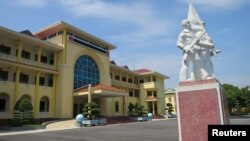U.S. President Barack Obama’s announced lifting of a decades-old arms embargo against Vietnam is raising eyebrows not only in China, where a dispute with Hanoi in the South China Sea inflames military tensions, but also in Russia.
Russia has long been Hanoi’s top weapons supplier. But, that dominance will slowly be eroded as the market is opened and U.S. arms dealers begin to seize the opportunity.
‘It will ultimately undermine Russian dominance in the Vietnamese market, but is unlikely to have a quick effect,” said Alexander Gabuev, chairman of the Russia-Asia Pacific program at the Carnegie Moscow Center, in e-mailed comments to VOA.
“The market environment will be more competitive, but Russia has a strong position in terms of value-for-money of its systems, the Vietnamese military's long-standing ties to Russian producers and the need to train personnel. A lot will depend on whether the U.S. government will support possible sales of American systems, and what the position of the next government will be."
.
The U.S. ban on lethal weapons supplies to Vietnam was lifted after non-lethal arms sales were eased in 2014. However, all sales still have to meet U.S. government approval.
“I wouldn't expect a sudden surge in US arms exports to Vietnam as the inertia in the sphere of arms procurement is very strong,” said Anton Tsvetov, a researcher at the Russian International Affairs Council (RIAC), in e-mailed replies to VOA.
“Russia," he added, "is likely to retain its dominance on the Vietnamese arms market in most of the high-value sectors, such as fighter jets, combat ships and missile defense systems, at least for the decade to come. The U.S., however, may occupy certain niches, including maritime surveillance and reconnaissance."
Vietnam has been seeking to beef up its navy as China builds its military presence around disputed islands in the South China Sea. By the end of this year, Russia is expected to deliver the last of six Kilo-class diesel submarines to Vietnam.
According to Tsvetov, while Moscow will not welcome the prospect of competition with U.S. arms dealers, the significance has less to do with military concerns than politics. “For the overall state of Russia-Vietnam relations, this development is certainly a wake-up call for Russia," he said. "Moscow will have to work harder to maintain strong ties with Vietnam."
Russia’s official TASS news agency on Monday quoted the deputy head of Federal Service for Military-Technical Cooperation, Anatoly Punchuk, saying the embargo being lifted would not affect Moscow’s arms supplies to Vietnam.
"Our relations with Vietnam are of a strategic character and their further development will depend on the leadership of Vietnam,” said Punchuk.
Vietnam’s Prime Minister Nguyen Xuan Phuc met last week with Russian President Vladimir Putin in Moscow and during a summit in Sochi with leaders of the Association of Southeast Asian Nations (ASEAN).
“Hanoi, for its part, is very careful to demonstrate that this is not a pivot from Russia, but a move towards a well-balanced foreign policy, one normal for an aspiring middle power, said Tsvetov.
“The long and substantial visit to Moscow and Sochi by the new Vietnamese PM Nguyen Xuan Phuc, among other things, was meant to reassure the Russian leadership that Vietnam is still loyal to its strategic partnership with Russia, no matter what developments the Obama visit brings," he said.
The Russia-ASEAN summit was seen as a bid by Moscow to expand its so-called “pivot east” beyond improving relations with China.
Hanoi has been concerned that Russia has tilted towards Beijing’s position in the South China Sea dispute by opposing internationalization of the conflict. Still, Moscow has managed to balance their relations thus far.
Russia sells arms to both sides, and Gazprom, its state gas company, drills in disputed waters. Gabuev said China understands that if it insisted Russia choose the larger Chinese market over Vietnam's, Hanoi would turn to more strategically uncomfortable suppliers. “It will have nowhere else to go (other than to) Japan or to the United States," he said. "China definitely doesn't want to see that outcome."
Speaking in Vietnam on Monday, Obama said that lifting the ban was a part of normalizing relations and not aimed at China, though Beijing sees it differently.
“We may see even more aggressive efforts of Rosoboronexport [Russia’s state arms dealer] to boost its presence in Vietnam, as China is likely to prefer increased Russian-Vietnamese military ties to American-Vietnamese” ties, said Gabuev. “Moscow will look at the issue from predominantly business perspective, not in terms of balance of power."




